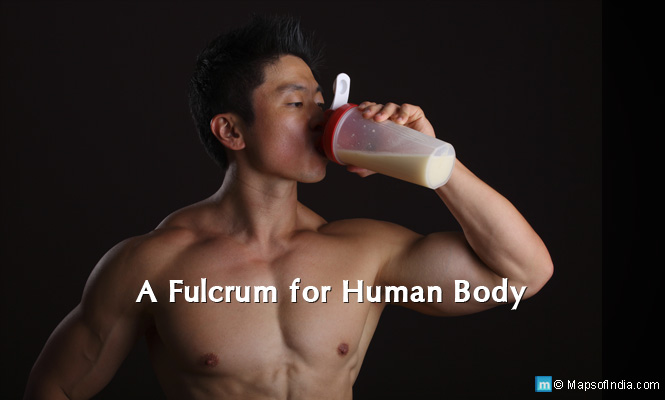Protein – A Fulcrum for Human Body
Today’s hectic life has made humans devoid of several important nutrients. The lack of time and knowledge about these nutrients makes human beings fall ill or have problems like tiredness, obesity and other diseases. The modern life demands a lot from humans and in such a case we usually forget to take care of our body – the engine of our existence! One such nutrient is protein which plays a chief role in staying healthy and strong. So, what are proteins and what should we eat to meet the protein demand – let’s have a look.
What are Proteins?
Proteins are building blocks of human body and a key factor in maintaining proper health. For a fit body and to perform different activities, our body needs various vitamins, minerals and nutrients. One of the most important nutrients that our body requires is protein. To function properly, each and every cell of human body requires protein. As a universal rule of thumb, our body should consume 1 gram of protein per kilogram of body weight per day.
The most important feature of a balanced diet is accurate amount of protein intake. This accurate amount differs from one individual to another depending on various factors. Any individuals’ protein input depends upon various factors such as growing, pregnancy, prime of life and intensity of workload. Protein should be taken regularly in the diet. Our body does not require as much of proteins as compared to carbohydrates. Taking too much of proteins can also be badly affect the body. It might develop heart, kidneys or liver disorders. Taking less protein can also affect health negatively. So consumption of the right quantity is imperative.
PRODIGY Survey: 80% Indian diets are Protein deficient
In India, we consume gluten fat and starch but insufficient protein. Due to this, India is also known as a protein-deficient state. Unfortunately, IMRB conducted latest survey PRODIGY – ‘Protein Consumption in the Diet of Adult Indians Survey’ proves that 80% of Indians are protein-deficient. This survey was conducted in seven main cities of India amid 1,260 citizens in which about 91% of the Vegetarians and 85% of the Non-Vegetarians Indians were found to be deficient in protein. In India, lack of adequate proteins in food can lead to undernourishment causing fatigue, decreased immunity, muscle mass failure and a weakened cardiovascular system.
PRODIGY underlines the fact that proteins are essential for every process like metabolism, digestion, transportation of nutrients and oxygen to blood. It also produces antibodies that fight against infections and illness.
Latest Indian Ranking in Food Security Index
Economist Intelligent Unit, conducted latest study on global food security index, shows India as a protein-deficient country and ranks 68th out of 114 countries surveyed. In the study, India’s overall score was 50.9, affordability 47.4, availability 56.1, and quality and safety 45.3.
Proposed Protein Diet
Proteins are found in both vegetarian as well as non-vegetarian food. To know what to eat to accumulate the right protein amount in the body, let’s read about it:
India is a great source of protein-rich vegetarian foods. There is a misconception among people that only vegetarian food cannot provide the required protein. Well, it is not true. It is believed that only non-vegetarian foods consist of rich proteins; however, there are a number of vegetarian foods that can help the body acquire rich and balanced proteins.
A Protein-rich Vegetarian Diet includes:
Tofu: Tofu is a protein-rich food, which if consumed one half cup raw and firm, can provide around 10.1 grams of proteins. Many nutritionists commend daily consumption of 56 grams of proteins or men and 46 grams for women. Tofu is made from soybeans, by curdling soymilk and then into a cake-like shape.
Chickpeas: Chickpeas is considered to be a very good protein food and is popularly known as garbanzo beans. Chickpeas are low in calories and full of healthy proteins and fiber, which keep the body fit and energetic. Chickpeas can be used in various ways – -boiled chickpeas can be added in salads or pastas and can even be made into hummus (originally an Arabic dish). Chickpeas are mostly cooked in Indian and Mediterranean diets. Curries, dips, soups and sauces can be made out of this protein-rich food. 100 grams of chickpeas in salads can provide about 19 grams of protein.
Soybeans: People who are pure vegetarians can rely on this food for adequate consumption of protein in their diet. The vital amino acids in soybeans make it a whole protein. Out of all types of beans, soybeans have the highest amount of protein. Consumption of soybeans provides protein nearly equal to having meat and dairy products. 100 grams of raw soybeans consists of 36 grams of proteins.
Dry fruits/ Nuts: Cashew nuts, almonds, peanuts and pistachios are rich sources of protein. Soaking them in water for some time and then consuming them makes it more nutritious and healthy. They can be eaten as a snack and fills you quickly when you have hunger pangs. Dry and roasted cashew nuts are high on proteins and low on fats. 100 grams of dry and roasted cashew nuts provide 15 grams of proteins to the body, whereas 100 grams of almonds consist of 21 grams. Also, 100 grams of walnuts have 15 grams protein in them. Indian diet uses nuts as snacks, garnishing sweet dish and desserts. Paste of cashew nuts and peanuts is also added to curries in Indian cuisine, which makes it thick and nutritious.
Besides the above mentioned foods, vegetables that contain good amount of protein are eggplant, cucumbers, onions, spinach, kale, green pepper, broccoli, lettuce, mushroom, zucchini and turnip greens.
Dairy Products: They are natural and healthy sources of protein. Dairy products must be included in everyday diet. It includes milk, curd, paneer, cheese and butter. Milk and cheese are surely rich sources of protein; however, milk from hybridized cows is not that rich. In fact, milk from goat and sheep (organic sources) are considered much protein-rich.
A Protein-rich Non-Vegetarian Diet includes:
Meat: Meat is rich in proteins and also fat. It is recommended to have grilled or roasted meat for a healthy life. Meat can include varieties such as beef, ham, lamb, goat, pork or veal.
Poultry: Proteins in poultry foods comprise of low saturated fats. They are rich sources of protein and should be included in the diet to stay in good physical shape. Poultry products consist of eggs, chicken, duck, goose and turkey. In addition, non-veg foods like lobsters contain 26 grams of protein in every 100 grams and crabs provide 19 grams protein in every 100 grams of serving.




